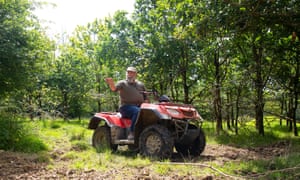Recent data highlights the need to preserve the fragile ecosystems in the Galapagos and the importance of encouraging sustainable tourism as travel opens up again
Leonardo DiCaprio has recently helped to launch a ten-year program that will work to save endangered species and repair damage from unsustainable ecotourism
Galapagos penguins and flightless cormorants have both recorded a 34% and 16% increase in population size in the past year respectively due to a lack of tourist disturbance.
One of the most biodiverse places on earth, the Galapagos is famous for supporting Charles Darwin’s theory of natural selection and the protected islands still inspire travelers today as they did the late naturalist.
The archipelago is home to a huge percentage of endemic bird, reptile and plant species not found anywhere else in the world, but very few visitors have been able to experience this during the past year with worldwide travel restrictions due to the coronavirus pandemic.
However, this has had a significant impact on the local wildlife and many native animal species have thrived as a result.
Galapagos penguins and flightless cormorants are two such species that have seen significant population growth during the past year, recording a 34% and 16% increase respectively and the latter now being at a record high for the last 40 years.
According to the Galapagos National Park and Charles Darwin Foundation, this increase is thought to be a result of the significant decrease in tourism allowing the nesting areas to be minimally disturbed.
Whilst this is a positive outcome of the last year, the organizations have recently launched an initiative to further help protect and rewild the Galapagos, which has been backed by a $43m pledge from actor Leonardo Dicaprio.
Many of the ecosystems on the islands are in crisis and the scheme will fund projects including the reintroduction of 13 locally extinct species and the protection of marine resources from the human impact of ecotourism.
According to a recent study, plastic was present in all marine habitats at the island of San Cristobal, with more than 400 plastic particles found per square meter of beach in the worst polluted locations.
This, coupled with the positive increase in native species populations over the last year, underlines the importance of sustainable and considerate tourism where visitors give extra thought to their means of travel and their actions during their visit.
And with tourism now beginning to open up again, one of the best ways that travelers can minimise their impact on the environment whilst still supporting the area’s economy is choosing a sustainable travel provider such as Touring Galapagos.
Michael Eiseman, Co-founder of Touring Galapagos, said: “Lockdown and the coronavirus pandemic have had a paradoxical impact on the Galapagos; native animal species have thrived as a result of limited disturbances but the halt in tourism has had a devastating impact on local businesses, with many struggling to stay afloat. That's why it's important that we get tourists back to exploring the area as soon as possible, but in a way that is both sustainable and educates them about the fragility of the habitats.
"Our staff and local guides in San Cristobal strive to educate travelers about how the Galapagos' marine vertebrates are the most at risk from swallowing plastic or getting entangled – including scalloped hammerheads, whale sharks, sea lions and sea turtles. Further to this important education, it's pledges and initiatives from trusts, Tour Companies, NGO's and celebrities, including Leonardo DiCaprio, that are all working towards the survival of the Galapagos Archipelagoes.”
The return of tourism to the Galapagos is essential in both keeping the local economy afloat and ensuring that conservation efforts can continue to be funded. Some 85% of the local economy identified as dependent on tourism and the sector estimated a loss of $850 million between March 2020 to March 2021.
For tourists, now is one of the most exciting times to visit the Galapagos and those first to visit the islands have the unique opportunity to discover its recently undisturbed natural beauty.
Those looking to experience the unique wildlife and tropical scenery in the Galapagos but minimise the impact of their travel should look no further than Touring Galapagos.
The sustainable travel company offers luxury cruises around the islands that focus on unique experiences and sustainability, providing their guests with tailored holiday itineraries that support the local population whilst preserving the natural habitats.
As of June 2021, travelers are only required to present a valid COVID vaccination certificate upon entry to visit Ecuador and Galapagos Islands rather than a mandatory PCR test.
Tags: Galapagos

